江苏省徐州市王杰中学八年级英语下册 Unit 1 Past and Present复习(无答案)(新版)牛津版
- 格式:doc
- 大小:205.00 KB
- 文档页数:16
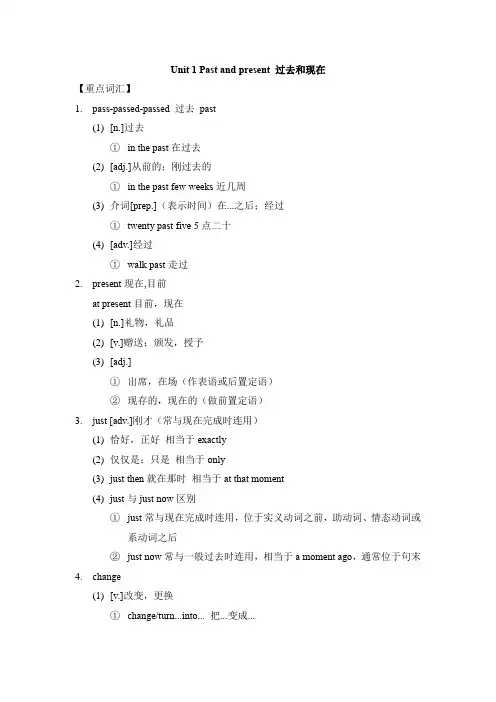
Unit 1 Past and present 过去和现在【重点词汇】1.pass-passed-passed 过去past(1)[n.]过去①in the past在过去(2)[adj.]从前的;刚过去的①in the past few weeks近几周(3)介词[prep.](表示时间)在...之后;经过①twenty past five 5点二十(4)[adv.]经过①walk past走过2.present现在,目前at present目前,现在(1)[n.]礼物,礼品(2)[v.]赠送;颁发,授予(3)[adj.]①出席,在场(作表语或后置定语)②现存的,现在的(做前置定语)3.just [adv.]刚才(常与现在完成时连用)(1)恰好,正好相当于exactly(2)仅仅是;只是相当于only(3)just then就在那时相当于at that moment(4)just与just now区别①just常与现在完成时连用,位于实义动词之前,助动词、情态动词或系动词之后②just now常与一般过去时连用,相当于a moment ago,通常位于句末4.change(1)[v.]改变,更换①change/turn...into... 把...变成...(2)[n.]变化,变革;零钱(不可数名词)5.since[conj.]&[prep.]自……以来6.ever[adv.]曾经7.northern北方的,北部的southern western eastern8.married已婚的,结婚的(1)get married结婚(2)be married已婚(3)9.wife妻子-wives[pl.](1)knife-knives(2)wolf-wolves(3)thief-thieves(4)half-halves(5)leaf-leaves10.away[adv.]离开,在(某距离)处(1)go away离开(2)right away立刻(3)take away带走(4)run away逃离(5)put away收起来(6)far away远离(7)keep...away from... 使...远离...11.block街区12.pollution污染;污染物(1)[v.]pollute(2)light pollution光污染(3)air pollution空气污染(4)water pollution水污染(5)noise pollution噪声污染13.problem[n.]问题,难题(1)question与ask/answer(2)problem难以解决问题solve/work out连用14.factory工厂15.waste(1)废料;废品(不可数名词)(2)[n.]浪费,可以和冠词a连用(3)[adj.]废弃的,无用的;荒芜的(4)[v.][新义]浪费,滥用①②16.realize[v.]意识到;实现(1)realize实现,是及物动词,被实现(2)come true实现,成为现实,是不及物动词,不能用于被动语态17.situation形势,情况18.husband丈夫19.impossible[adj.]不可能的(1)impossibly[adv.](2)possible[adj.]-possibly[adv.](3)possibility[n.]可能性20.interview采访;会见[新义]n.对……进行面试;采访21.environment环境condition环境,条件,状况22.lonely和alone(1)lonely形容词孤独的,强调人的内心感受;偏僻的。
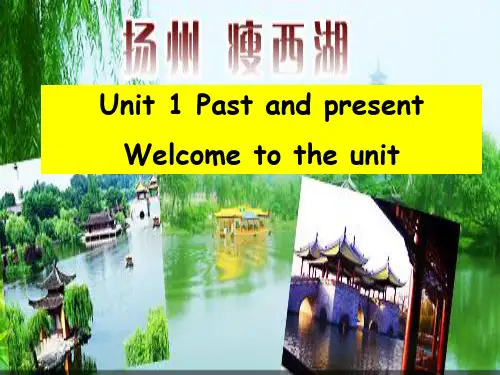
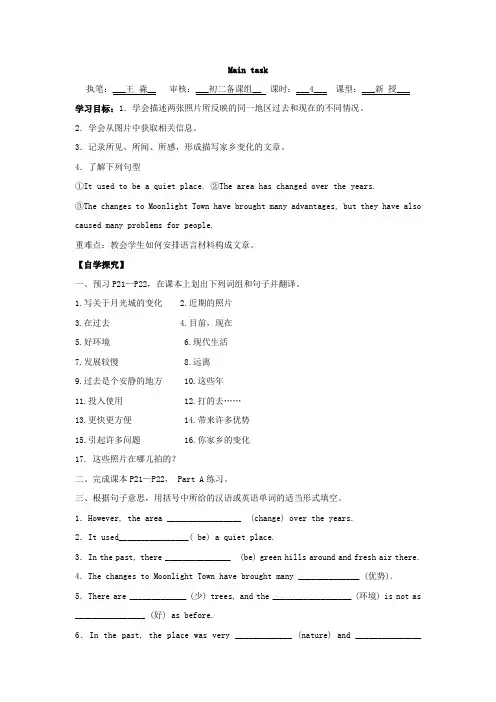
Main task执笔:___王淼__ 审核:___初二备课组__ 课时:___4___ 课型:___新授___学习目标:1.学会描述两张照片所反映的同一地区过去和现在的不同情况。
2.学会从图片中获取相关信息。
3.记录所见、所闻、所感,形成描写家乡变化的文章。
4.了解下列句型①It used to be a quiet place. ②The area has changed over the years.③The changes to Moonlight Town have b rought many advantages, but they have also caused many problems for people.重难点:教会学生如何安排语言材料构成文章。
【自学探究】一、预习P21—P22,在课本上划出下列词组和句子并翻译。
1.写关于月光城的变化2.近期的照片3.在过去4.目前,现在5.好环境6.现代生活7.发展较慢 8.远离9.过去是个安静的地方 10.这些年11.投入使用 12.打的去……13.更快更方便 14.带来许多优势15.引起许多问题 16.你家乡的变化17. 这些照片在哪儿拍的?二、完成课本P21—P22, Part A练习。
三、根据句子意思,用括号中所给的汉语或英语单词的适当形式填空。
1.However, the area _________________ (change) over the years.2.It used________________( be) a quiet place.3.In the past, there _______________ (be) green hills around and fresh air there. 4.The changes to Moonlight Town have brought many ______________ (优势). 5.There are _____________ (少) trees, and the __________________ (环境) is not as ________________ (好) as before.6.In the past, the place was very _____________ (nature) and _______________(beauty).7.When I was in primary school, my mother ______________ (take) me to school every day.8.I’m happy that she has time _______________ (relax) more.9.How long is it since she _________________________ (感冒)? She has __________________________ (感冒) since two days ago.10.I don’t believe you family ____________________ (拥有) a car for over ten years. 【当堂巩固】一、选择填空( ) 1. Our city _______ over the last five years.A. changesB. changedC. has changedD. is changing( ) 2. You can play football ________ before.A. as soon asB. as quick asC. as often asD. as good as( ) 3. Mr Li no longer ________ a good environment _______ his daughter.A. provides, toB. provides, forC. provided, betweenD. provides, of ( )4. They have lost their jobs _______ these changes.A. because ofB. becauseC. asD. so that( ) 5. ---_______ have you ever gone water-skiing? --- Only once a week.A. How longB. How soonC. How oftenD. When二、词汇运用1. Let’s make a plan to stop the noise __________ (污染).2. In the past several ___________(世纪), many things have ___________(改变) a lot.3. When did you get ___________(marry)?4. She has been in s______ in the hotel since 2006.5. The air in the country is nice and ______________ (新鲜). It’s good for our _____________ (健康).三、完成句子1. 我们城市的变化给我们带来了更多的机会。
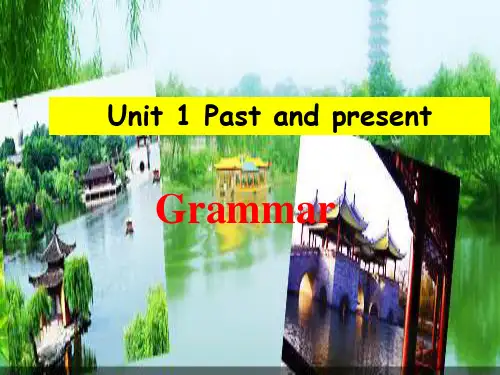
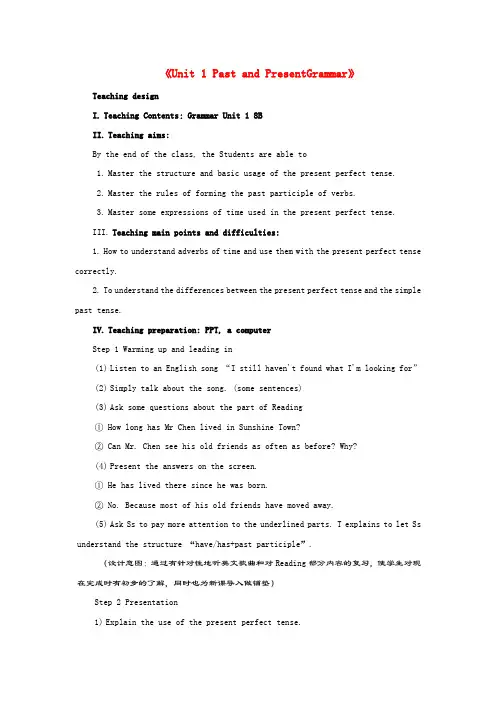
《Unit 1 Past and PresentGrammar》Teaching designI.Teaching Contents:Grammar Unit 1 8BII.Teaching aims:By the end of the class, the Students are able to1.Master the structure and basic usage of the present perfect tense.2.Master the rules of forming the past participle of verbs.3.Master some expressions of time used in the present perfect tense.III.Teaching main points and difficulties:1.How to understand adverbs of time and use them with the present perfect tense correctly.2.To understand the differences between the present perfect tense and the simple past tense.IV.Teaching preparation: PPT, a computerStep 1 Warming up and leading in(1)Listen to an English song “I still haven't found what I'm looking for”(2)Simply talk about the song. (some sentences)(3)Ask some questions about the part of Reading①How long has Mr Chen lived in Sunshine Town?②Can Mr. Chen see his old friends as often as before? Why?(4)Present the answers on the screen.①He has lived there since he was born.②No. Because most of his old friends have moved away.(5)Ask Ss to pay more attention to the underlined parts. T explains to let Ss understand the structure “have/has+past participle”.(设计意图:通过有针对性地听英文歌曲和对Reading部分内容的复习,使学生对现在完成时有初步的了解,同时也为新课导入做铺垫)Step 2 Presentation1)Explain the use of the present perfect tense.①.表示动作发生在过去并与现在有联系。
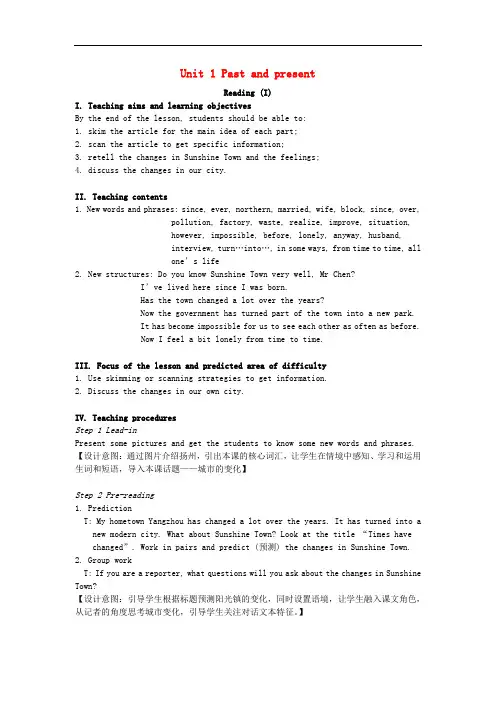
Unit 1 Past and presentReading (I)I. Teaching aims and learning objectivesBy the end of the lesson, students should be able to:1. skim the article for the main idea of each part;2. scan the article to get specific information;3. retell the changes in Sunshine Town and the feelings;4. discuss the changes in our city.II. Teaching contents1. New words and phrases: since, ever, northern, married, wife, block, since, over,pollution, factory, waste, realize, improve, situation,however, impossible, before, lonely, anyway, husband,interview, turn…into…, in some ways, from time to time, allone’s life2. New structures: Do you know Sunshine Town very well, Mr Chen?I’ve lived here since I was born.Has the town changed a lot over the years?Now the government has turned part of the town into a new park. It has become impossible for us to see each other as often as before.Now I feel a bit lonely from time to time.III. Focus of the lesson and predicted area of difficulty1. Use skimming or scanning strategies to get information.2. Discuss the changes in our own city.IV. Teaching proceduresStep 1 Lead-inPresent some pictures and get the students to know some new words and phrases. 【设计意图:通过图片介绍扬州,引出本课的核心词汇,让学生在情境中感知、学习和运用生词和短语,导入本课话题——城市的变化】Step 2 Pre-reading1. PredictionT: My hometown Yangzhou has changed a lot over the years. It has turned into a new modern city. What about Sunshine Town? Look at the title “Times have changed”. Work in pairs and predict (预测) the changes in Sunshine Town. 2. Group workT: If you are a reporter, what questions will you ask about the changes in Sunshine Town?【设计意图:引导学生根据标题预测阳光镇的变化,同时设置语境,让学生融入课文角色,从记者的角度思考城市变化,引导学生关注对话文本特征。
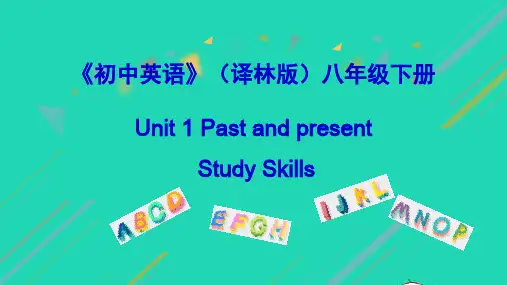
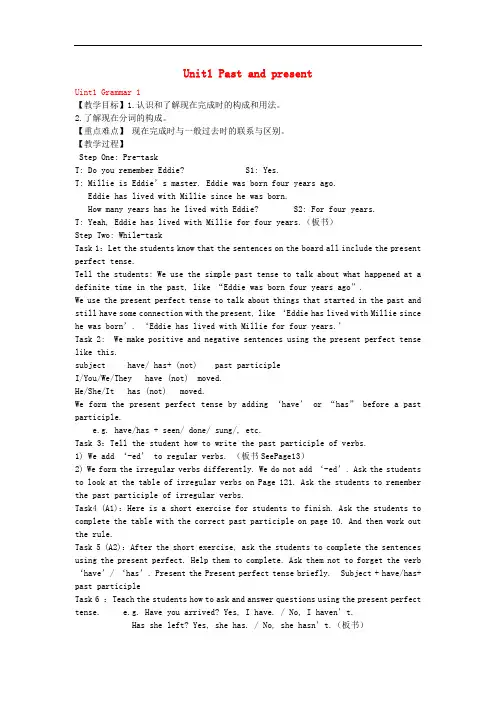
Unit1 Past and presentUint1 Grammar 1【教学目标】1.认识和了解现在完成时的构成和用法。
2.了解现在分词的构成。
【重点难点】现在完成时与一般过去时的联系与区别。
【教学过程】Step One: Pre-taskT: Do you remember Eddie? S1: Yes.T: Millie is Eddie’s master. Eddie was born four years ago.Eddie has lived with Millie since he was born.How many years has he lived with Eddie? S2: For four years.T: Yeah, Eddie has lived with Millie for four years.(板书)Step Two: While-taskTask 1:Let the students know that the sentences on the board all include the present perfect tense.Tell the students: We use the simple past tense to talk about what happened at a definite time in the past, like “Eddie was born four years ago”.We use the present perfect tense to talk about things that started in the past and still have some connection with the present, like ‘Eddie has lived with Millie since he was born’. ‘Eddie has lived with Millie for four years.’Task 2: We make positive and negative sentences using the present perfect tense like this.subject have/ has+ (not) past participleI/You/We/They have (not) moved.He/She/It has (not) moved.We form the present perfect tense by adding ‘have’ or “has” before a past participle.e.g. have/has + seen/ done/ sung/, etc.Task 3:Tell the student how to write the past participle of verbs.1) We add ‘-ed’ to regular verbs. (板书SeePage13)2) We form the irregular verbs differently. We do not add ‘-ed’. Ask the students to look at the table of irregular verbs on Page 121. Ask the students to remember the past participle of irregular verbs.Task4 (A1):Here is a short exercise for students to finish. Ask the students to complete the table with the correct past participle on page 10. And then work out the rule.Task 5 (A2):After the short exercise, ask the students to complete the sentences using the present perfect. Help them to complete. Ask them not to forget the verb ‘have’/ ‘has’.Present the Present perfect tense briefly. Subject + have/has+ past participleTask 6 :Teach the students how to ask and answer questions using the present perfect tense. e.g. Have you arrived? Yes, I have. / No, I haven’t.Has she left? Yes, she has. / No, she hasn’t.(板书)The teacher asks the students some more questions.Task7 Chat time (A3) :Millie and Sandy are talking about a film about Hong Kong. Complete their conversation using the correct forms of the verbs in brackets.1) Give them several minutes to complete it.2) Check the answers with the whole class.3) Ask some pairs to act out the conversation.Step Three: Post-taskI. 分清一般过去时与现在完成时I cleaned the blackboard half an hour ago (只说明“擦”和其发生的时间)I have cleaned the blackboard. (说明现在黑板是干净的)总结:(1)一般过去时只表示过去的动作或状态, 和现在不发生关系。
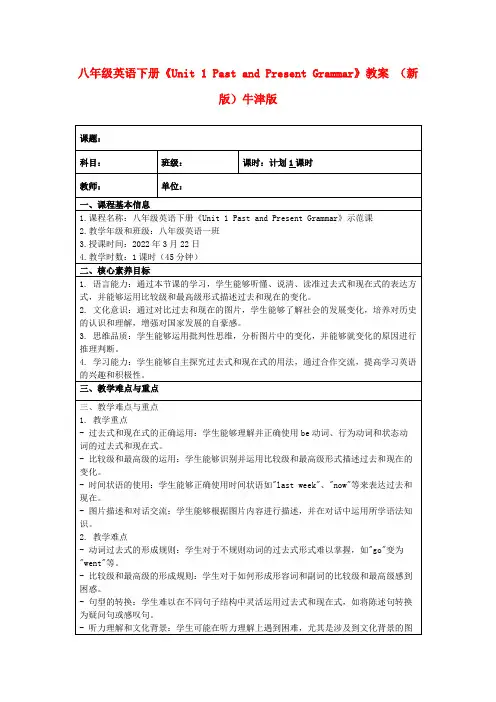
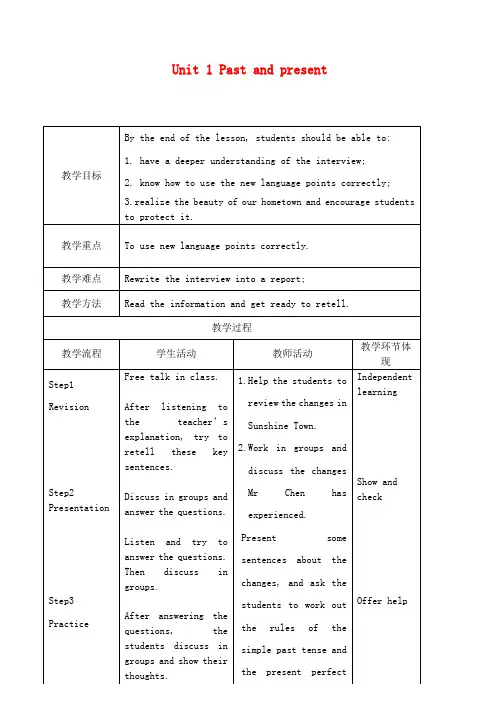
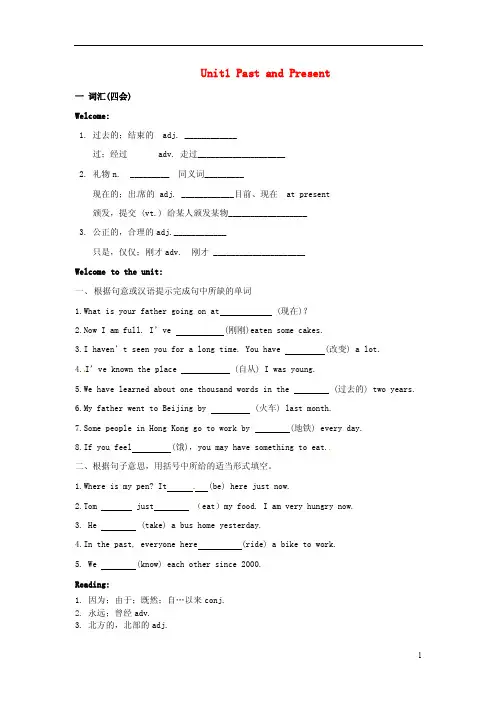
Unit1 Past and Present一词汇(四会)Welcome:1. 过去的;结束的 adj. ____________过;经过 adv. 走过____________________2. 礼物n. _________ 同义词_________现在的;出席的 adj. ____________目前、现在 at present颁发,提交 (vt.) 给某人颁发某物__________________3. 公正的,合理的adj.____________只是,仅仅;刚才adv. 刚才 _____________________Welcome to the unit:一、根据句意或汉语提示完成句中所缺的单词1.What is your father going on at (现在)?2.Now I am full. I’ve (刚刚)eaten some cakes.3.I haven’t seen you for a long time. You have (改变) a lot.4.I’ve known the place (自从) I was young.5.We have learned about one thousand words in the (过去的) two years.6.My father went to Beijing by (火车) last month.7.Some people in Hong Kong go to work by (地铁) every day.8.If you feel (饿),you may have something to eat.二、根据句子意思,用括号中所给的适当形式填空。
1.Where is my pen? It (be) here just now.2.Tom just (eat)my food. I am very hungry now.3. He (take) a bus home yesterday.4.In the past, everyone here (ride) a bike to work.5. We (know) each other since 2000.Reading:1. 因为;由于;既然;自…以来conj.2.永远;曾经adv.3. 北方的,北部的adj.n._________ —在…北方______________________/______________________-南方 n._____________—adj____________./东方n_________.—adj____________./西方n.__________—adj_____________to the+方位名词+of...指互不接壤并互不管辖的两个地区.例:Japan is to the east of China.日本在中国以东.(不接壤)in the +方位名词+of...指在某一范围内的地区.例:Beijing is in the north of China.北京在中国的北部.(在内部)on the+方位名词+of...指相互接壤并互不管辖的两个地区例:The Pacific is on the east of China.太平洋在中国的东面.(接壤)4. 已婚的;与…结为夫妻的;婚姻的adj. _____________v._________ 与某人结婚____________________/______________________已经结婚多长时间 ________________________________________________5. 妻子n. _________pl.______________6. 块;街区n. __________7.(表示方向)越过;(部份或全部覆盖)在…上面;超过;(表示论及)关于prep. ___________ 翻过这座山_______________________ 结束adv._________ 放学____________8. 污染n.___________光、水、噪音,空气污染 __________________________________被污染9. 工厂,制造厂n. __________________10. 浪费,白费n. __________________徒劳;(使)损耗;(使)消瘦;浪费vt.& vi. _____________waste sth. = _________________11. 实现;了解,意识到vt. ______________12. 形势,处境_______________ 改善形势 __________________13. 不管到什么程度;无论如何;然而adv.___________________14. 不可能的,做不到的adj. ______________ 反义词________________15. prep. 在…之前_____________ 饭前__________________16. 孤独的,孤单的;寂寞的;荒凉的adj. ___________________感到孤独_____________________;一座荒凉的岛__________________________ 单独的;独一无二的;独自的adj.单独地;独自地;孤独地;只,只有adv. 独自呆在家里___________________18. 无论如何;而且;尽管adv._____________19. 丈夫n. ___________________20. 接见;采访;面试;会谈n. _________________面试vt.& vi.采访;访问;会见;(私下)提问vt.采访某人______________________________/________________________________Reading:一、根据句意或汉语提示完成句中所缺的单词1.The park is in the (北部的)part of the city.2.Their (妻子) are all nurses.3.We lived together till 1965 when I got (结婚)。
Unit1 Past and Present一词汇(四会)Welcome:1. 过去的;结束的 adj. ____________过;经过 adv. 走过____________________2. 礼物n. _________ 同义词_________现在的;出席的 adj. ____________目前、现在 at present颁发,提交 (vt.) 给某人颁发某物__________________3. 公正的,合理的adj.____________只是,仅仅;刚才adv. 刚才 _____________________Welcome to the unit:一、根据句意或汉语提示完成句中所缺的单词1.What is your father going on at (现在)?2.Now I am full. I’ve (刚刚)eaten some cakes.3.I haven’t seen you for a long time. You have (改变) a lot.4.I’ve known the place (自从) I was young.5.We have learned about one thousand words in the (过去的) two years.6.My father went to Beijing by (火车) last month.7.Some people in Hong Kong go to work by (地铁) every day.8.If you feel (饿),you may have something to eat.二、根据句子意思,用括号中所给的适当形式填空。
1.Where is my pen? It (be) here just now.2.Tom just (eat)my food. I am very hungry now.3. He (take) a bus home yesterday.4.In the past, everyone here (ride) a bike to work.5. We (know) each other since 2000.Reading:1. 因为;由于;既然;自…以来conj.2.永远;曾经adv.3. 北方的,北部的adj.n._________ —在…北方______________________/______________________-南方 n._____________—adj____________./东方n_________.—adj____________./西方n.__________—adj_____________to the+方位名词+of...指互不接壤并互不管辖的两个地区.例:Japan is to the east of China.日本在中国以东.(不接壤)in the +方位名词+of...指在某一范围内的地区.例:Beijing is in the north of China.北京在中国的北部.(在内部)on the+方位名词+of...指相互接壤并互不管辖的两个地区例:The Pacific is on the east of China.太平洋在中国的东面.(接壤)4. 已婚的;与…结为夫妻的;婚姻的adj. _____________v._________ 与某人结婚____________________/______________________已经结婚多长时间 ________________________________________________5. 妻子n. _________pl.______________6. 块;街区n. __________7.(表示方向)越过;(部份或全部覆盖)在…上面;超过;(表示论及)关于prep. ___________ 翻过这座山_______________________ 结束adv._________ 放学____________8. 污染n.___________光、水、噪音,空气污染 __________________________________被污染9. 工厂,制造厂n. __________________10. 浪费,白费n. __________________徒劳;(使)损耗;(使)消瘦;浪费vt.& vi. _____________waste sth. = _________________11. 实现;了解,意识到vt. ______________12. 形势,处境_______________ 改善形势 __________________13. 不管到什么程度;无论如何;然而adv.___________________14. 不可能的,做不到的adj. ______________ 反义词________________15. prep. 在…之前_____________ 饭前__________________16. 孤独的,孤单的;寂寞的;荒凉的adj. ___________________感到孤独_____________________;一座荒凉的岛__________________________ 单独的;独一无二的;独自的adj.单独地;独自地;孤独地;只,只有adv. 独自呆在家里___________________18. 无论如何;而且;尽管adv._____________19. 丈夫n. ___________________20. 接见;采访;面试;会谈n. _________________面试vt.& vi.采访;访问;会见;(私下)提问vt.采访某人______________________________/________________________________Reading:一、根据句意或汉语提示完成句中所缺的单词1.The park is in the (北部的)part of the city.2.Their (妻子) are all nurses.3.We lived together till 1965 when I got (结婚)。
4.My father has worked in this (工厂)for more than twenty years.5.The poison in the (废物)killed fish and plants.6.The government (意识到)it was a very serious problem.7.I feel a bit (孤独的)form time to time.8.The (情况)is now different.9.I feel a bit tired. (然而), I can hold on .10.It may rain, but we shall go (无论何时)。
11.She walked four (街区)down High Street.12.Would you like to have a (改变)?13.Have you (曾经) been t o Beijing?14.What does her (丈夫)do?15.The weather is beginning to (改进)。
二、根据句子意思,用括号中所给的适当形式填空。
1.Nothing is (possible) if you put your heart into it.2.I used to (live) in the country.3.My teacher (teach) in this school for ten years.4.Water (pollute) was a serious problem then.5. The river is much (clean)than before.6. They (live) in Nanjing sin ce they (move) to China.7. you (put) away my book? I can’t find it anywhere.8. My brother (be) born in 1983. Since then, he (live) in this city.9. My uncle used to (be ) a driver, but now he is a worker.10. It’s nice (have) pretty gard ens.Grammar:1. 但是;还,常用语疑问句和否定句 adv. _____________2. 最近,近来adv. ____________________Grammar:一根据句意或汉语提示完成句中所缺单词。
1.Have you read this book (已经)?2.We haven’t seen each other (最近)。
3. How long has Mr. Smith (教) English so far?4. Have you (吃) anything since 9:00?5.It’s about changes in Beijing over the past (世纪).二、根据句子意思,用括号中所给的适当形式填空。
1. Mr and Mrs Li (not come) back yet.2. you (see) any exhibition recently?3.I (see) it in the history museum last week.4. Don’t worry. The train just (arrive).5. They already (decide) to go to Japan for the holiday.6. you (study) in the school two years ago.7. In the past few year, my hometown (chang e) a lot.8. I (eat) my lunch just now.9. He (teach) us English since two years ago.10.He (live) here for five years.Integrated skills:1. 环境n. _____________保护环境 __________________2. 状态;环境;健康状况n. ____________ 生活状况__________________3. 回转,返回v.________________ 把…归还…____________________4. 上一次,最近一次;最后adv. ____________5. 到国外,在海外adv.________________ 去国外______________________6. 交流,交际vt.___________________ 与某人交流 _________________________7. 交流 n._______________8. 精确地;确切地adv.__________________Integrated skills & Speak up:一根据句意或汉语提示完成所缺的单词。